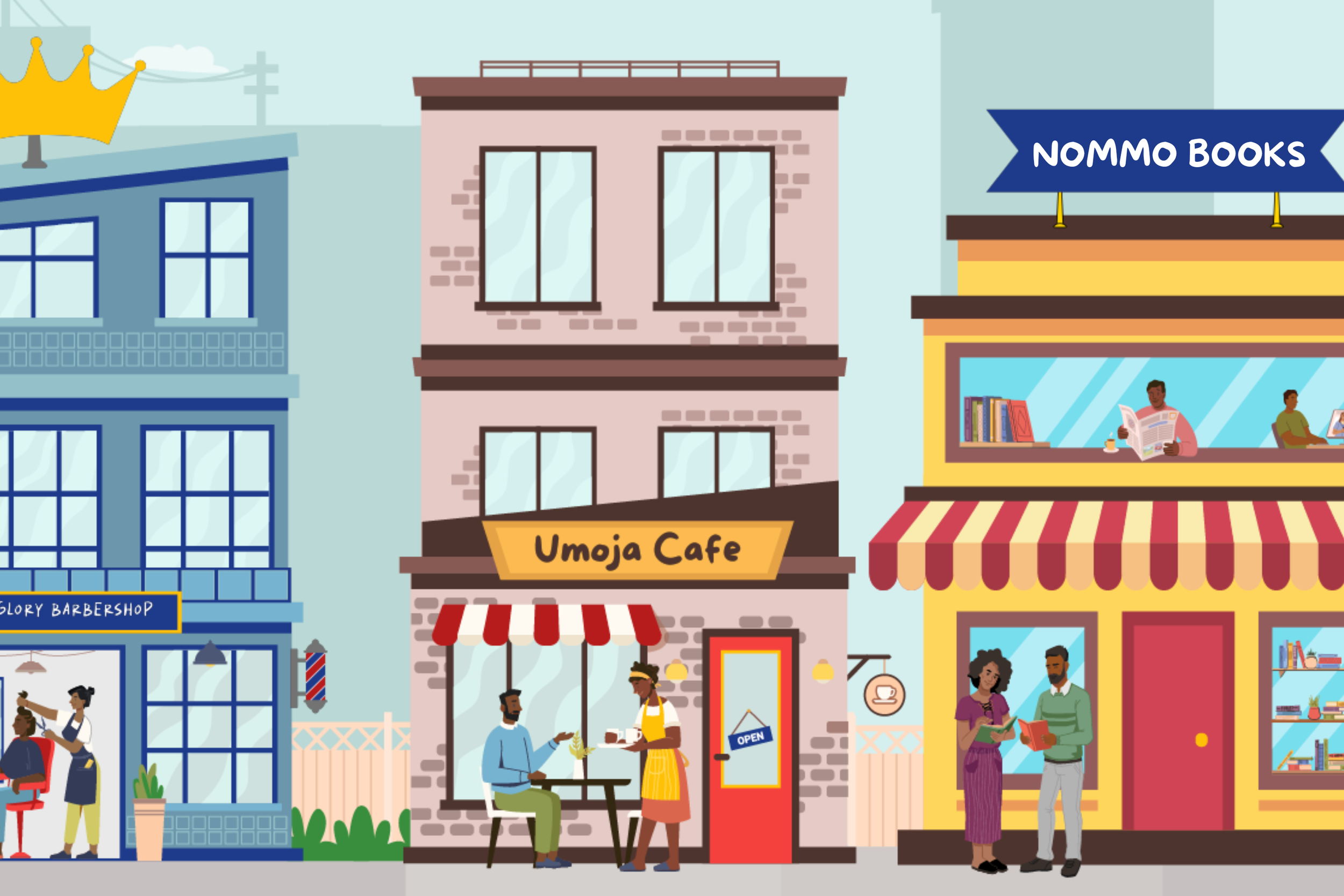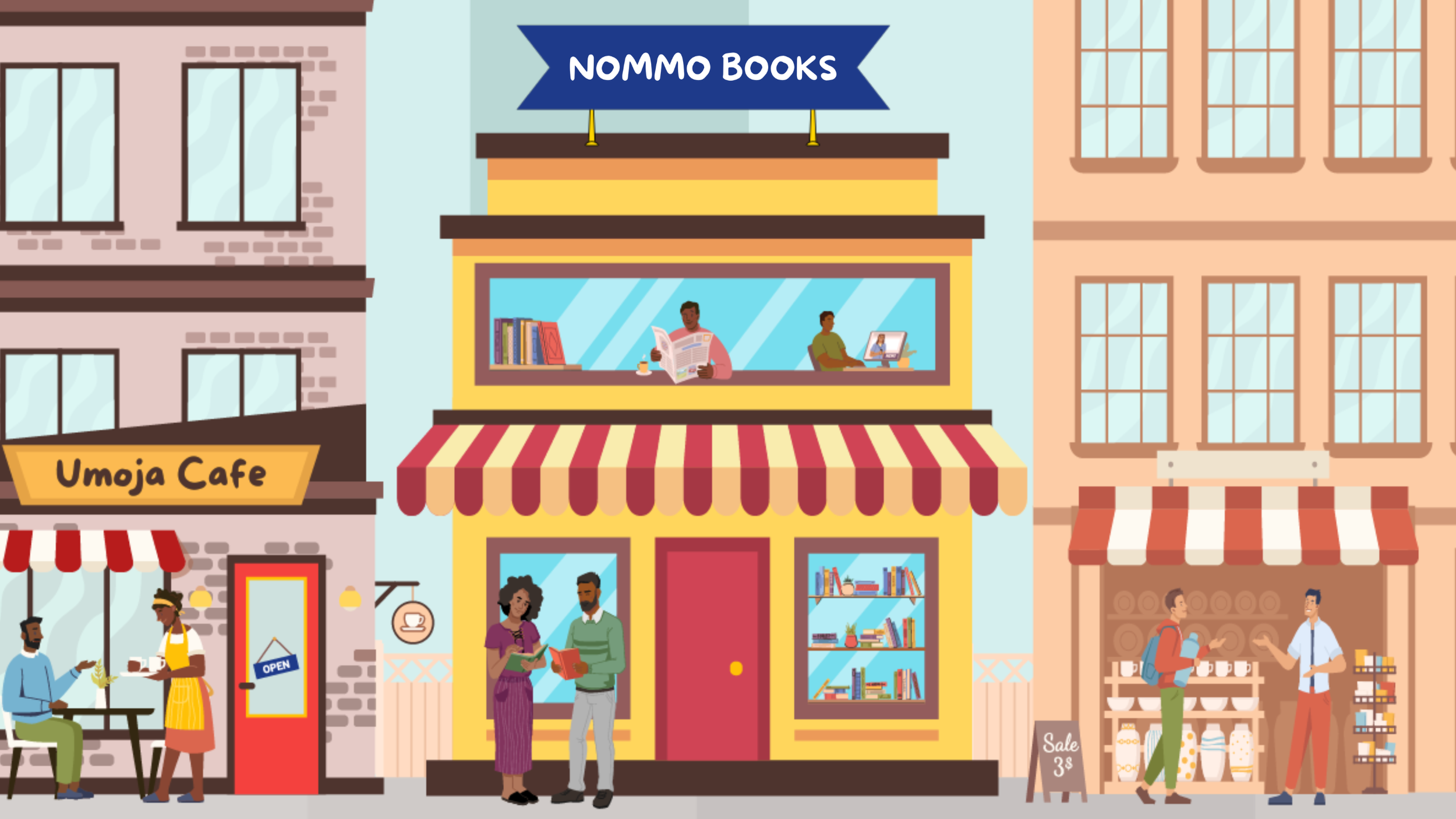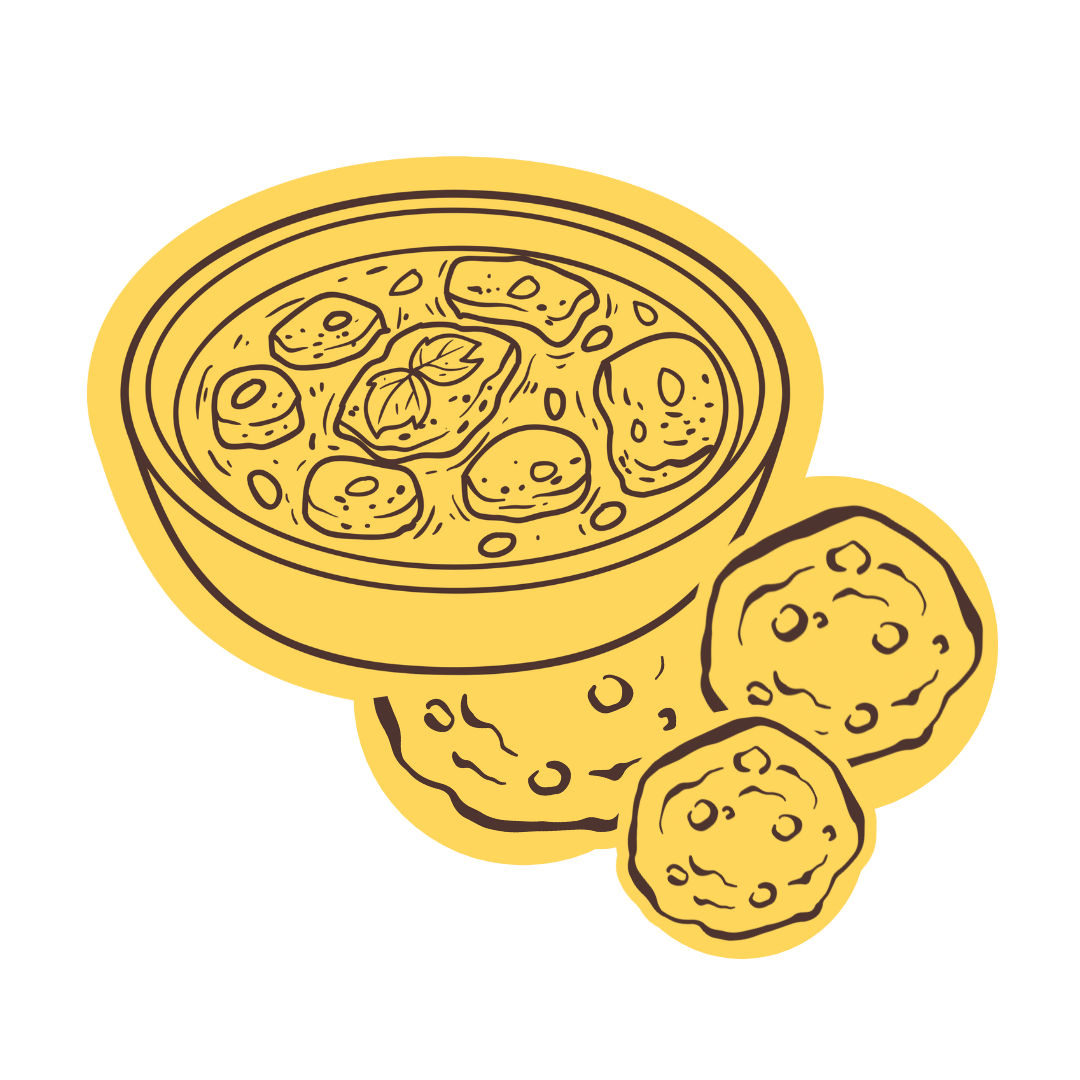
Come in to Umoja Cafe
•
Come in to Umoja Cafe •
Pull up a chair. The air is thick with the aroma of cornbread, collard greens, and Jollof rice.
At Umoja Café, every table is a safe table. Here, joy and rest are served alongside the hard conversations, because we know healing comes best with a good plate and good company.
The Umoja Cafe vibe
Aisha “Sunshine” Thompson greets you with a smile and something warm from the oven — or from her heart.
At Umoja Café, every table is a safe table. Here, joy and rest are served alongside the hard conversations, because we know healing comes best with a good plate and good company.

Listen to these short AUDIO STORies from umoja cafe
Umoja Café is the gathering heart of YAIT Town — a place where conversation moves happens (sometimes erupts!), flavors stay honest, and community feels like a warm hand on your back
Umoja means “unity” in KiSwahili.
Ms. Aisha “Sunshine” Coleman, the Sistah-Owner, chose that name with intention and love.
She says a café should do more than feed people; it should hold people.It should be a place where we sit together, talk together, rest together, and remember that we were never meant to navigate this world alone.
When you step inside Umoja Café, you’re greeted by the smell of cinnamon, roasted coffee beans, and a hint of ginger simmering on the back stove.
Ms. Aisha keeps a kettle going all day — hibiscus tea, spiced cocoa, and her famous honey-cardamom steam.
She highlights the work of a different Black artist every month. Could be a sculptor, photographer, musician, dancer, or even a magician! Keep checking for her monthly genius picks.
The hum of conversation blends with soft soul music, domino tiles clicking, spoons tapping against ceramic cups, and, of course, the crisp sound of an espresso machine.
the Umoja cafe is A listening space, where short stories, reflections, and conversations play throughout the day.
Umoja Café is more than a place to eat.
It’s where we practice unity — in how we speak, how we rest, how we care for one another.
A place where your spirit can settle and your shoulders can drop.
A place that reminds you that belonging is a right, not a reward.
Akwaaba/Welcome to Umoja Café.
Take your time.
You’re among your people.
One love, Fam!
umoja cafe Moments
One table in the corner always seems to have the kind of laughter that starts soft and then suddenly breaks open like a cracked drum.
Aisha just lifts her eyes and smiles, as if to say, “Let joy do what it came to do.”
Doesn’t it feel good when a room lets you laugh with your whole body?
Someone always insists on shaking just a little extra cinnamon into their drink, talking about “ancestral measurements.”
A stranger nearby nods in agreement — because everyone here knows exactly what that means.
This is YAIT Town
Two people sit together not saying much, just sipping slowly.
Every few minutes one asks, “You good?” and the other says, “I’m getting there.”
No pressure. No fixing. Just presence.
Sometimes healing sounds like hot tea and quiet companionship.
A stool at the counter is rarely empty — not because people stay long, but because everyone knows it’s the unofficial “drop by and say something real” seat.
Someone sits, shares a truth, laughs, sighs, then moves on.
Do you feel how community can happen in five minutes or less?
A small group debates something lively — cookout rules, relationship wisdom, hair politics.
Voices rise, hands wave, someone snaps in agreement, and then suddenly the whole café says in unison:
“Say that again!”
A joyful chorus.
This is what truth sounds like when everybody’s awake and paying attention.
You ain’t imagining this.
what you’ll find in Umoja cafe
A community table, where people gather to talk about everything from joy to justice.
A quiet corner, perfect for writing, reading, or catching your breath.
A menu rooted in Black comfort: sweet potato muffins, plantain flatbreads, spiced coffees, and herbal teas from across the Diaspora.
the umoja cafe menu
Food with memory. Food with meaning. Food that reminds us who we are.
Here in Umoja Café, what we serve in our menu isn’t just a list of dishes — it’s a story.
A map of the Black Diaspora written through flavor, migration, survival, and joy. Every bowl, sip, and slice carries a history: of someone’s grandmother, someone’s village, someone’s Sunday kitchen.
We offer these foods not just to fill you, but to ground you, to welcome you, and to remind you that the flavors we carry across oceans always bring us home.
BREAKFAST: SOUTHERN ROOTS
-
“My father said you can tell a person’s spirit by how they stir their grits — slow, steady, patient. That’s how we start the day here.”
These grits come from stone-ground corn the way our ancestors made it — coarse, creamy, and full of the earth’s warmth.
Butter melts into every ridge, reminding you of front porches, early mornings, and somebody humming in the kitchen.
It’s a Southern tradition with West African roots, carried through centuries of ingenuity and endurance.
A bowl of real grits holds history — and care. -
“This is for the aunties who taught us that sweetness in the morning isn’t indulgence — it’s ceremony.”
Plantains simmered until tender, swirled with spices and coconut milk — this porridge tastes like the Caribbean greeting the dawn.
It honors the aunties who made sweetness a ritual, not a reward.
The plantain connects us back to Africa, across the Middle Passage, through the Caribbean islands, and into our modern kitchens.
A warm, golden bowl for mornings when you need comfort that doesn’t apologize. -
“My first sip of Ethiopian coffee felt like coming home to a place I’d never been. We serve it here to honor the mothers of coffee.”
The birthplace of coffee — Ethiopia — gives us a brew that is bold, fragrant, and ancient.
We roast it gently and bloom it with cardamom, just as families do in the Ethiopian buna ceremony.
Every cup is an offering to the women who first cultivated and brewed this bean long before the world called it a commodity.
It’s not just caffeine — it’s lineage. -
“When life was too loud, my grandmother would say, ‘Sit. Drink this. Let your heart slow down.’ This tea is our hush.”
Steeped hibiscus blossoms give this tea its deep ruby color — the same drink known as bissap, sorrel, agua de Jamaica, and karkadé across the Diaspora.
Ginger adds warmth.
Hibiscus adds grounding.
Together they quiet the mind and soothe the heart, the way grandmothers have done for generations.
This isn’t just tea — it’s a pause.
MIDDAY PLATES: ACROSS THE DIASPORA
-
“Collards are the story of survival — slow-cooked, stubborn, and full of grace. We stir them with gratitude for everyone who held on.”
Collards came to us from West Africa and held steady through enslavement, sharecropping, migration, and resistance.
Simmered low and slow, they soften without breaking — like our people.
Cornbread sits beside them like a warm handshake, golden and familiar.
This plate is a history lesson disguised as lunch. -
“A fusion for the wandering ones: African fire with a modern grain. This is for those of us living in many places at once.”
We bring Ghanaian and Nigerian jollof flavor — tomato, chile, onion, fire — to quinoa, the grain that traveled from Indigenous Andean farmers to our modern tables.
This bowl honors rootlessness and rootedness at the same time.
It’s for the nomads, the bridge-walkers, the multi-homed.
A true Diaspora dish. -
“My neighbor Miss Thelma taught me curry on a rainy Thursday. She said, ‘Season it until your ancestors nod.’ We’ve been honoring them ever since.”
Curried goat traces a path from India to Jamaica to Trinidad to Black kitchens all over the world.
Slow-cooked until tender, layered with warm spices, and scooped up with soft roti — this dish carries stories of migration, colonization, resistance, and reinvention.
Every bite is history stewed into tenderness. -
“Okra ties continents together. Millet feeds whole villages. This bowl reminds us we were connected long before we were divided.”
Okra traveled from West Africa to the American South, to Brazil, to the Caribbean — binding flavors and communities wherever it went.
Millet is one of the oldest cultivated grains on the continent, nourishing empires and families alike.
Together, they make a stew that feels ancient and alive, humble and regal.
A bowl of pure Diaspora memory.
EVENING SWEETS & SIPS
-
“We serve the 7-Up cake from my grandmother’s recipe. It’s how we remember her laughter — bright, light, and rising.”
A cake that traveled through so many Black cookouts, repasts, and reunions that it’s practically kin.
Lemon-laced, airy, with that unmistakable 7-Up sweetness — every slice tastes like someone’s auntie hollering, “Now don’t touch that yet, it’s cooling!”
A dessert that rises like laughter. -
“Bread pudding was for the end of a long day when the house felt quiet. Coconut makes it feel like a warm hand on the back.”
Soft, warm bread soaked in spices and coconut milk — this dessert belongs to Caribbean kitchens, Sunday suppers, and nights when comfort needs to be thick and sweet.
It’s the dessert you eat slowly.
The one that turns silence into solace. -
“This cocoa is for the nights when you need to be reminded that softness is strength too.”
Dark cocoa warmed with cinnamon and citrus peel — the way West African and Caribbean families have been flavoring chocolate drinks for centuries.
It coats your throat and loosens your shoulders.
It tastes like a lullaby in a cup.
A reminder that rest is resistance. -
“Sorrel is celebration — weddings, babies, new houses, old friends. Lime keeps it honest. Together, they taste like joy with boundaries.”
Sorrel (hibiscus) has crossed oceans with us — a drink for gatherings, family news, and celebrations.
Brightened with lime and chilled over ice, this mocktail tastes like Caribbean holidays, West African festivals, and every joyful gathering where someone yells, “Come get your drink!”
Joy with boundaries — refreshing and real.
The umoja Café playlist
This is the heart of the Café’s daily energy: thoughtful, honest conversations.
these are yaits podcast episodes Perfect for the first cup of the day
— grounding, clarifying, nourishing.
These conversations live at the café table — the place where we tell the truth, gently but honestly, about what it means to move through predominantly white spaces as Black people–and how Black empowerment, health, and joy feel. Pull up a chair! ☕

“I opened Umoja Café to keep our flavors and stories alive—the taste of home, the sound of jazz, the calm of being seen. You’re welcome here, always.”
- Aisha Coleman

Want a tour of the rest of yait town?
Join the YAit town
community
Come on in. There’s room for you in YAIT Town.
When you join the YAIT Town Community Newsletter, you’re not signing up for noise or pressure. You’re stepping into a space made with care. A place to stay connected, stay informed, and stay grounded.












